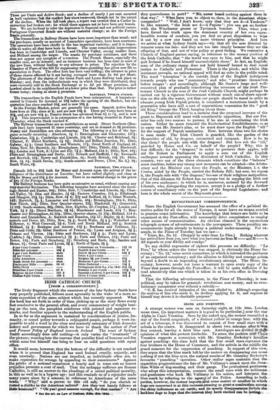REVOLUTIONARY' CORRESPONDENCE.
Since the English Government has assumed the office of a political de- tective police for all the states of Europe, it must leave no means untried to procure exact information. The knowledge that letters are liable to be examined at the Post-office, will necessarily drive conspirators to employ other means of communication. An obvious channel is the mysterious telegraph system of advertisements in the newspapers. These puzzling an- nouncements begin already to betray a political under-meaning. For ex- ample, in the Times of Tuesday last we saw- " Yours, &c., No. 12. (Stopped by order from Le Pere.) Nothing whatever has arrived here from you, save what you have sent use from —
All depends on your fidelity and courage."
To any skilful expounder of ciphers this presents no difficulty. "Le Pere," by whose orders the letter was stopped, is obviously the Home Se- cretary; "No. 12," some secret committee, to which is intrusted the guidance of an organized conspiracy; and the allusion to fidelity and courage points. beyond a doubt to an impending revolutionary attempt. The Home Se- cretary, however, needs not issue a warrant to open every copy of the Times that passes through the Post-office; it will be quite sufficient if he read attentively that one which is taken in at his own office in Downing Street.
That the following advertisement, in the Times of Thursday, is non- political, may be taken for granted: revolutions cost money, and no revo- lutionary conspirator ever refused a subsidy- " C. K. has received intimation of the sum alluded to. Although respecting the motives of him who sends it, he declines applying for it, and requests he himself may devote it to charitable purposes."


























 Previous page
Previous page